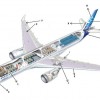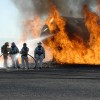Jet lag – Cause and Management
[audio:https://aviationenglishblog.com/wp-content/uploads/2010/09/05jetlag.mp3|titles=Jet lag – Causes and Management]Jet lag – Cause and Management
Also called desynchronosis, jet lag is a medical condition that occurs as a result of air travel across countries in different time zones in a short period of time. This is different from air sickness which is nausea experienced by some people every time they travel by air.
Some of the common symptoms of jet lag include headache, fatigue, insomnia, disrupted sleep pattern, irritability and digestive trouble.
The body can tell the time of the day with the help of specific signals that are received by the senses. For example, the optic nerve in the eyes receives information about the amount of light or darkness outside and transmits this to the hypothalamus, the part of the brain that controls various bodily functions like temperature, hunger, thirst and sleep as well.
When the eyes perceive darkness (sunset) the hormone melatonin is released in the body. This hormone promotes sleep. When the sun rises and there is light, the hypothalamus receives this information and reduces the amount of melatonin that is being produced. In addition to sleep patterns, there are other circadian rhythm patterns like hunger, thirst and bowel movement that are linked. Continuous exposure to sunlight or perception of a continuous night that does not end for many hours can result in a disruption of the circadian rhythm. This is what happens when you travel through different time zones. And it takes the body some time to readjust to the changed schedule.
The jet lag varies in intensity depending on the direction of travel and also the number of time zones that you cross. The more time zones you cross, the more severe the jet lag symptoms are likely to be. Travelers who fly from north to south do not experience severe jet lag symptoms as much as those travelers travelling from west to east. This is because there is no travel across time zones if you travel exactly north to south.
There are ways to manage jet lag and plan for the change in schedule a few weeks before flying. A more convenient way is to break your journey and give your body time to rest instead of travelling to the other side of the globe. So if you are traveling from the US to India, try breaking your journey somewhere in Europe, if you can.
Another way in which to avoid jet lag is to eat as little as possible during the flight. This may be tough if you have a good sumptuous meal that is being offered. Walk up and down the aisle a few times after a few hours and drink large amounts of water to keep yourself hydrated. Trying to manage your sleep based on the time of the place that you will land in also helps.
Questions:
1) What is desynchronosis?
a) Air Sickness
b) Jet Lag
c) Air sickness and Jet Lag
d) None of the above
2) Which organ controls sleep in the body?
a) Entire brain
b) Eyes
c) Hypothalamus
d) Optic Nerves
3) What controls the intensity of the jet lag in individuals?
a) Time of travel during the day
b) How comfortable your travel is
c) What you eat during the flight
d) The time zones that you cross and direction of travel
4) Who is likely to suffer from a jet lag?
a) Person travelling from Spain to South Africa
b) Person traveling from Canada to China
5) What can help relieve jet lag symptoms?
a) Break in your journey
b) Preparing your body for travel ahead of time
c) Drinking large amounts of water and keeping yourself hydrated
d) All of the above
Continuous exposure to sunlight or perception of a continuous night that does not end for many hours can result in a disruption of the circadian rhythm. This is what happens when you travel through different time zones. And it takes the body some time to readjust to the changed schedule.
The jet lag varies in intensity depending on the direction of travel and also the number of time zones that you cross. The more time zones you cross, the more severe the jet lag symptoms are likely to be. Travelers who fly from north to south do not experience severe jet lag symptoms as much as those travelers travelling from west to east. This is because there is no travel across time zones if you travel exactly north to south.
There are ways to manage jet lag and plan for the change in schedule a few weeks before flying. A more convenient way is to break your journey and give your body time to rest instead of travelling to the other side of the globe. So if you are traveling from the US to India, try breaking your journey somewhere in Europe, if you can.
Another way in which to avoid jet lag is to eat as little as possible during the flight. This may be tough if you have a good sumptuous meal that is being offered. Walk up and down the aisle a few times after a few hours and drink large amounts of water to keep yourself hydrated. Trying to manage your sleep based on the time of the place that you will land in also helps.
Questions:
1) What is desynchronosis?
a) Air Sickness
b) Jet Lag
c) Air sickness and Jet Lag
d) None of the above
2) Which organ controls sleep in the body?
a) Entire brain
b) Eyes
c) Hypothalamus
d) Optic Nerves
3) What controls the intensity of the jet lag in individuals?
a) Time of travel during the day
b) How comfortable your travel is
c) What you eat during the flight
d) The time zones that you cross and direction of travel
4) Who is likely to suffer from a jet lag?
a) Person travelling from Spain to South Africa
b) Person traveling from Canada to China
5) What can help relieve jet lag symptoms?
a) Break in your journey
b) Preparing your body for travel ahead of time
c) Drinking large amounts of water and keeping yourself hydrated
d) All of the above
Answers 1) B 2) C 3) D 4) B 5) D Another problem that may occur is the Air Rage, click here and know a little more about it!
















Gostei muito, parabéns